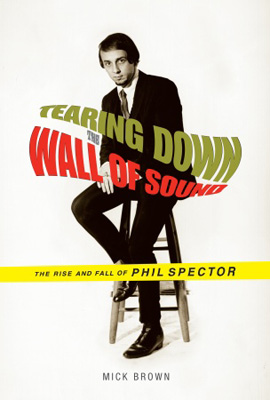
Interview with Mick Brown.
Tearing Down the Wall of Sound: The Rise and Fall of Phil Spector

wn the Wall of SoundTearing Do
The Rise and Fall of Phil Spector
by Mick Brown
Q: Have you always been a fan of Spector’s music?
A: Of course! For anybody growing up in the 50s and 60s I think it’s almost impossible not to be a fan of his music. The first Spector song I remember hearing, when I was about 12 or 13 years old, was Zip-A-Dee-Doo-Dah by Bob B. Soxx and the Blue Jeans. I’d never heard anything like it–Darlene Love wailing, the get-happy gospel chorus. The whole thing was dark, incantatory, and disturbingly sexual in a way I couldn’t put my 12 or 13 year old finger on. Great pop music not only functions as a soundtrack for one’s life but I think it also serves as a kind of lexicon of the emotions. The best Spector songs–Da Doo Ron Ron and You’ve Lost That Lovin’ Feelin’–like the best of Motown, gave definition and meaning to the confused and exhilarating gamut of feelings I was experiencing as a teenager. They plant a seed and forge a connection, which lasts a lifetime.
Q: What is the significance of the legendary "Wall of Sound" to pop music history?
A: At a time when most people–even people who made it–considered pop music to be disposable, flash-in-the-pan ephemera, Phil Spector was the only record producer to really consider what he was doing as art. He approached it with the same dedication, passion, intensity, and commitment to perfectionism as any great artist would approach their work. He was also a genius in the studio. When recording technology was comparatively primitive, he developed a technique of augmenting instrumentation, manipulating sound and echo to build up this monumental neo-classical sound, which was of a scale and sophistication never before heard in pop. He was a direct influence on a legion of artists and producers who came after him–Brian Wilson and Bruce Springsteen, to name just two. Plus, he shook up the industry in a way that nobody else had done. Spector co-wrote songs, produced them, released them on his own label, built himself as a legend–the First Tycoon of Teen, in Tom Wolfe’s memorable phrase–and in so doing, challenged the prevailing order of the record business, and made himself a lot of enemies in the process.
Q: Have you always been a fan of Spector’s music?
A: Of course! For anybody growing up in the 50s and 60s I think it’s almost impossible not to be a fan of his music. The first Spector song I remember hearing, when I was about 12 or 13 years old, was Zip-A-Dee-Doo-Dah by Bob B. Soxx and the Blue Jeans. I’d never heard anything like it–Darlene Love wailing, the get-happy gospel chorus. The whole thing was dark, incantatory, and disturbingly sexual in a way I couldn’t put my 12 or 13 year old finger on. Great pop music not only functions as a soundtrack for one’s life but I think it also serves as a kind of lexicon of the emotions. The best Spector songs–Da Doo Ron Ron and You’ve Lost That Lovin’ Feelin’–like the best of Motown, gave definition and meaning to the confused and exhilarating gamut of feelings I was experiencing as a teenager. They plant a seed and forge a connection, which lasts a lifetime.
Q: What is the significance of the legendary "Wall of Sound" to pop music history?
A: At a time when most people–even people who made it–considered pop music to be disposable, flash-in-the-pan ephemera, Phil Spector was the only record producer to really consider what he was doing as art. He approached it with the same dedication, passion, intensity, and commitment to perfectionism as any great artist would approach their work. He was also a genius in the studio. When recording technology was comparatively primitive, he developed a technique of augmenting instrumentation, manipulating sound and echo to build up this monumental neo-classical sound, which was of a scale and sophistication never before heard in pop. He was a direct influence on a legion of artists and producers who came after him–Brian Wilson and Bruce Springsteen, to name just two. Plus, he shook up the industry in a way that nobody else had done. Spector co-wrote songs, produced them, released them on his own label, built himself as a legend–the First Tycoon of Teen, in Tom Wolfe’s memorable phrase–and in so doing, challenged the prevailing order of the record business, and made himself a lot of enemies in the process.
Q: For the book, you interviewed dozens of musicians connected with Spector over the years. Who was the most interesting to speak to?
A: The short answer is, all of them. It was fascinating talking to Larry Levine, Spector’s engineer, about those great Gold Star sessions.
Q: Given the enormity of changes in the way music is produced, marketed and consumed, will there ever be another Phil Spector?
A: I don’t think so. The record business was a different world in those days–smaller and in many ways more innocent. Artists generally are much more savvy now than they were then, and more independent and less reliant on ‘Svengali’ figures like Spector. At the same time, the dominance of three or four monolithic recording companies would make it much harder for an independent operation, like Phil’s was, to make the kind of impact it did in the 60s. As to whether there will be brilliant and gifted producers making wonderful music–certainly there will be. But I don’t think there will ever be another Phil Spector.